How to Own Your Mistakes Without Drowning in Shame
Lessons on responsibility vs. accountability from a plant murderer
Have you ever noticed how "I'll do it tomorrow" can suddenly turn into six weeks of tomorrows? One minute, you're confidently volunteering to water your neighbour's garden while he's on an extended tour of Europe ("How hard can it be?"). The next, you're standing over a horticultural crime scene, trying to reconcile your good intentions with very dead hydrangeas.
Even if your sense of time runs like a Swiss watch, I bet you know that pit-in-your-stomach feeling when you've really dropped the ball on something important.
For those of us with ADHD, this time-warp phenomenon isn't just an occasional "oops!" — it's our brain's favourite party trick. Time blindness means we truly believe every "I'll do that later" because our brains struggle to grasp the space between now-now and not-now.
Today is crystal clear, tomorrow is a misty concept, and next week might as well be next century. Whenever I thought about those plants, my brain helpfully chirped, "You've still got time!" Until suddenly, catastrophically, during a two-week drought that August, I became the accidental murderer of my neighbour's garden. Not intentionally — I'm not some horticultural serial killer. But between a toxic work situation eating my soul and my ADHD brain's exceptional talent for time blindness, those plants never stood a chance.
By the time my neighbour returned, his garden looked like a scene from The Walking Dead, minus the zombies (unless you count the crispy remnants of his prized hydrangeas). This is where I learned — the hard way — the difference between taking responsibility and being accountable. Sure, I could (and did) say, "I'm so sorry about your plants!" But real accountability meant facing how my actions impacted trust and relationships.
A Home Depot gift card couldn't fix this (can’t blame a girl for trying). Some damage isn't just botanical — it's relational. Sometimes, taking accountability means sitting with the discomfort when your olive branch isn't accepted and learning from it anyway. (Ugh. Stupid truths.)
When shame crashes the accountability party
My neighbour’s rage was totally justified. I had one job! And I failed spectacularly. And while my reflex was to defend myself with tales of workplace drama and executive dysfunction, this wasn't just about dead plants anymore. It was about broken promises.
But here's where it gets messy (beyond the dead plants): His anger landed right on top of the shame pile I was already carrying from work, where I was being bullied into believing I couldn't do anything right. The universe seemed to be confirming my worst fears about myself: That I was unreliable, untrustworthy, and fundamentally broken.
Two things can be true at once: I f*cked up AND I am not my f*ck-up.
Let that sink in for a minute.
Lately, I’ve been thinking about how I’ve historically handled mistakes — not just in friendships, but in my own self-perception. How do we take responsibility without taking on unnecessary shame?
Between recent heartbreaks and setbacks, I've had little choice but to sit with what's actually within my control. Which, as it turns out, is nothing more than my reactions and responses. For those of us who try to control things as a response to childhoods full of unpredictability and chaos, this is a hard pill to swallow: The only things we truly own in life are our words and our actions. (Thanks, Thich Naht Hanh!)
ADHD already makes feeling in control of my actions a challenge due to very real and deeply misunderstood symptoms. Shame makes it worse. It twists “I forgot to water the plants” into “I ruin everything.” It twists “I should have communicated better” into “I am incapable of being a good friend.”
But here’s what I’m working on: Accountability doesn’t require shame.
Think about how we treat kids (or pets) when they mess up. We don’t say, "Well, clearly, you’re worthless because you spilled that juice." We say, "Oops! Let’s clean this up and figure out how to prevent it next time."
So why are we so much harder on ourselves?
What I’ve been learning through therapy, coaching, and approximately 47 self-help books is this: Taking accountability doesn’t mean we have to take on shame as an identity. We can say, "I messed this up, I’m sorry, and I understand why you’re angry," without adding, "...and this proves I’m a terrible human being who deserves to be exiled to a distant planet."
But I won’t sugarcoat it: It takes a LOT of practice.
Accountability lessons for recovering perfectionists
Shame is kind of like quicksand — the more we struggle against it, the deeper we sink. But when we learn to extend ourselves the same grace we'd offer a friend (or even a stranger's neglected hydrangeas), we create space to actually learn from our mistakes instead of just beating ourselves up about them.
Unlearning shame takes practice. That’s putting it lightly. It’s like learning to ride a bike, except the bike is on fire, and everything is complicated. And like any good recovering perfectionist people-pleaser, I find myself repeating these truths until I believe them:
Acknowledging harm doesn't mean accepting shame
Someone else's anger at my actions doesn't define my worth
ADHD makes certain tasks harder, but that's an explanation, not an excuse
I can hold space for both my impact AND my intentions
Like the meds that help me focus or the timers that remind me to check the laundry, these statements are tools — not hard and fast truths. At first they feel clunky, like reciting lines in a play. But with practice, they start to feel more natural. Some days, I repeat them hourly, occasionally while stress-eating Chipits straight from the bag. Slowly, they're becoming less like Pinterest quotes and more like lived experience.
So, what does this look like in practice?
The language of owning our sh*t
(Because sometimes we need a script beyond “My bad!”)
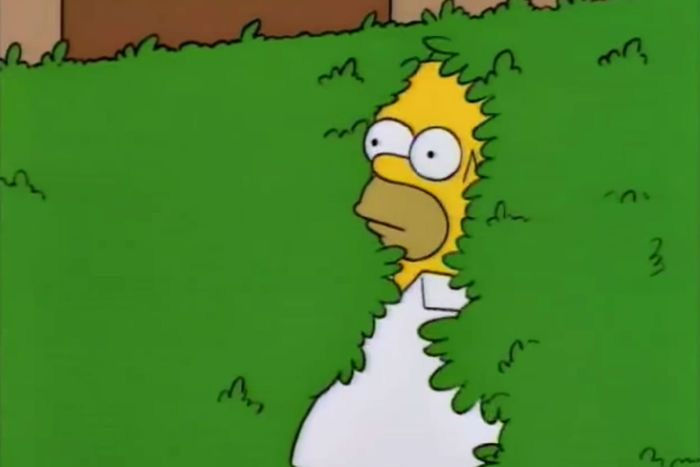
Let's look at how responsibility and accountability played out in the Great Plant Massacre. The difference shows up clearly in the words we choose:
Taking Responsibility (surface level):
"I'm so sorry about your plants! Things were crazy at work..."
"I meant to water them, I really did!"
"I feel terrible about this."
Notice how these all center MY feelings and explanations? Classic defensiveness masquerading as an apology. Like putting a Band-Aid on a sunburn — it might make you feel better momentarily, but it doesn't actually help heal the damage.
Taking Accountability (the deeper work):
"I let you down, and I take full responsibility for that."
"I get why you’re upset — I would be too. This wasn’t fair to you."
"What can I do to make this right?"
“I see now that this was about more than the plants. I broke your trust.”
"I should have told you I was struggling instead of letting your garden die."
Sometimes, it's too late. While I couldn't undo the damage to his plants or our neighbourly relationship (he literally crosses the street when he sees me coming), it’s only the worst thing ever if I don’t take the lessons and learn from them.
What can I learn about setting realistic expectations? About not taking on responsibilities when I'm already drowning? About the difference between "I can't be trusted" and "I made a mistake?"
It's like my therapist says (bless her infinite patience): "You're not responsible for having ADHD, but you are accountable for how you manage it." Ouch, and also... fair.
Where do we grow from here?
The real work isn't in the initial "I'm sorry" — it's in what happens next. It's in those quiet moments after the apology when we sit with our discomfort and ask ourselves what we need to learn. But if we can stay present with the lessons instead of drowning in shame, each mistake becomes a stepping stone rather than a stumbling block.
Maybe you're carrying around your own version of my dead plants story. Something where your best intentions crashed into your human limitations and left casualties in your wake.
I want you to know something important:
You can own your mistakes without letting them own you.
Because there's always going to be a next time, friends. We're human — we'll keep messing up in new and creative ways. That's the point: Progress over perfection. The goal isn't perfect accountability — it's getting better at recognizing our impact and making meaningful changes.
Questions for the comments: How do you balance accountability with self-compassion? When you've really messed up, how do you make it right without making yourself wrong? I’d love to hear your stories so I can feel less sh*tty about my current ones.
XOXO,
Nad
P.S. For what it's worth, I now have exactly zero plant-sitting responsibilities and a very clear understanding of my limitations. Sometimes, the best apology is never having to make the same one twice.
Reflection questions
To help this sink in, here are the questions I'm learning to ask myself:
(Because you made it all the way down here. And because some of you understand that “doing the work” means homework.)
What impact did my actions (or inactions) have on others?
What stories am I telling myself to avoid feeling the full weight of this?
How can I repair the harm without expecting forgiveness?
What boundaries do I need to set with myself to prevent this from happening again?
Where else in my life am I saying yes when I should be saying, "I can't commit to that right now"?


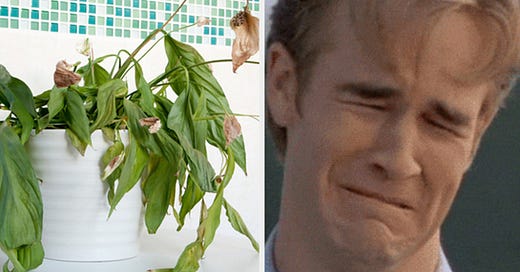



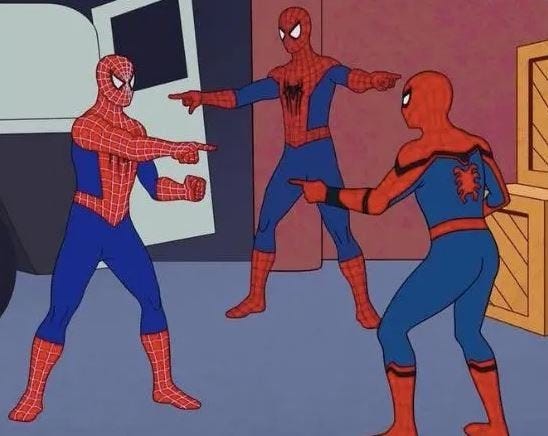
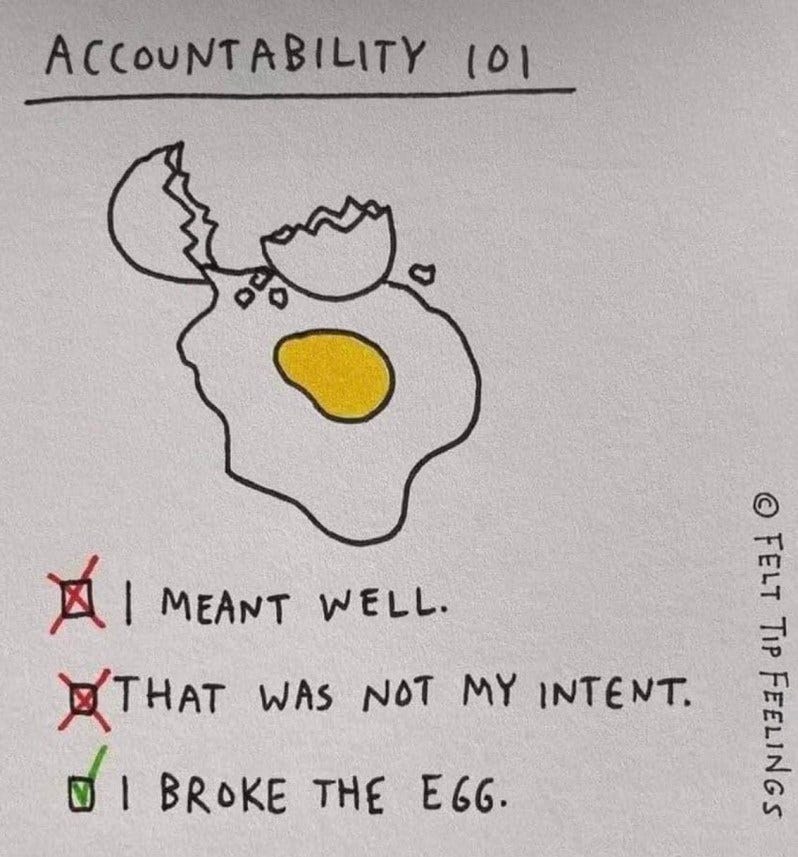

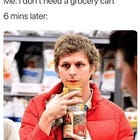
Love this. Thanks for making me realize some of my apologies are non apologies! Also: your neighbour's reaction sounds a bit harsh, imho. Maybe another post about moving on and not holding grudges against humans 😝
OMG good for you for even attempting to deal with plants. Love responsibility vs accountability and not layering on the shame.